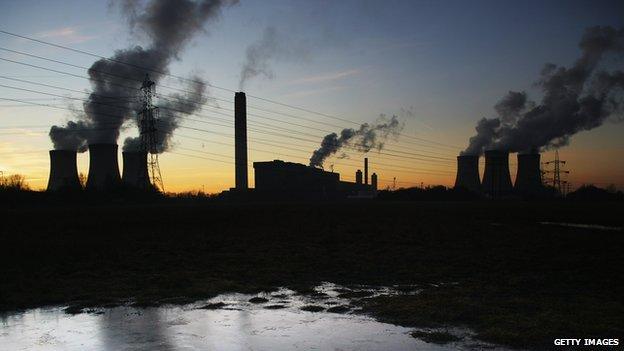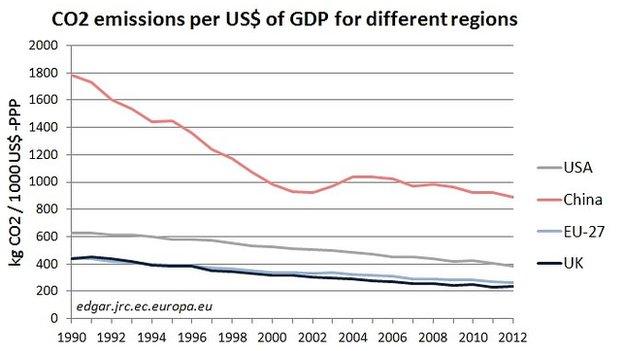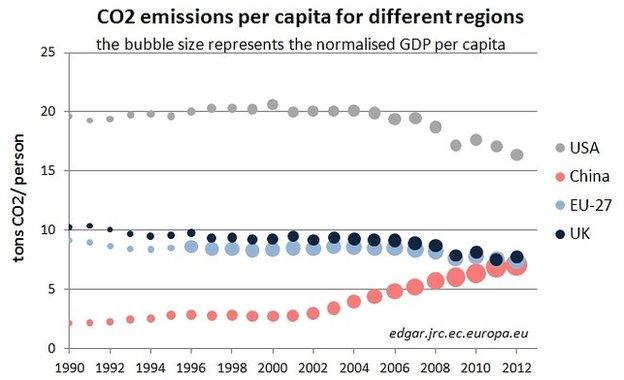Wavering on UK climate policy 'not justified'
- Published

Britain is playing its part in a worldwide bid to reduce emissions and should not weaken its proposed cuts, says a report to the UK government.
The Committee on Climate Change says no change in global science or policy justifies a slackening of effort.
The report was compiled after Chancellor George Osborne said the UK's competitiveness might be put at risk by leading the world in curbing emissions.
The CCC research challenges this assumption.
"It is not accurate to say that the UK is leading the world on this," the CCC’s chief executive David Kennedy told BBC News.
"We aren’t acting alone. We have made ambitious commitments, but other countries have too – they are acting on them and developing low-carbon technologies.
"Some of our European counterparts are discussing targets stricter than ours for 2030 so if we want to be part of the low-carbon revolution we will have to make sure we aren’t left behind."
How Norway uses sewage to heat homes
Mr Kennedy said China was now clearly global leader in clean technology: "China is leading the low-carbon revolution. It has committed to invest in 700 Gigawatts of renewable power generation by 2020 – that’s 10 times the whole UK power system.
"They are investing in five million electric vehicles – in multiples of what we are doing here.
“Even the US is cutting its emissions and is committed to doing so in coming years.”
The shale gas revolution in the US has forced down emissions because gas is much less polluting than coal; the report says it is likely that the US will meet its commitment to reduce 2020 emissions by 17% on 2005 levels.
It points out that China has committed to reduce carbon-intensity by 40-45% from 2005 to 2020, and introduced policies to deliver in its 12th five-year plan. With ongoing action, China’s emissions could peak in the early 2020s, the report says.
Not enough
It says Germany has also made medium-term commitments in line with the UK.
But Mr Kennedy admitted that the world’s efforts were still nowhere near enough to keep the world on track for a high likelihood of a stable climate.
The World Meteorological Organization has announced that greenhouse gases has reached another record.
UNEP’s Emissions Gap report also warned that delaying emissions cuts would make the task even more expensive.
The CCC was founded to advise government on how to meet the Climate Change Act, which commits the UK to reducing CO2 80% by 2050, in a step-by-step process.

For several years the Chancellor has expressed fears about the impact of climate policies on the affordability of energy in the UK. At the Conservative Party conference he told The Times, external that Britain should not be "in front of the world" on tackling climate change.
But the Climate Change Act was designed specifically to make it hard for future politicians to weaken long-term priorities when faced with political difficulty. In order to reduce the UK’s targets, there needs to have been a weakening of the science base or of international action.
But the CCC’s report says: “We conclude in this report that, in respect of science, international and EU criteria, there has been no significant change in the circumstances upon which the budget was set. In this regard, there is therefore no legal or economic basis to support a change in the fourth carbon budget.
A Treasury spokesman said: "We want to tackle climate change, but it should be done in a way that doesn't put huge costs on people's energy bills or destroys manufacturing jobs. The shale gas revolution in America shows you can reduce carbon emissions, bring bills down and create jobs."
The committee thinks the UK is most unlikely to experience a US-style shale gas boom.
The committee is concerned at the political backlash against green energy, which it believes has been fuelled by newspaper campaigns.

It says renewable energy subsidies are likely to bring down energy bills in the medium term if gas prices continue to rise as many analysts forecast.
Doug Parr from Greenpeace said: "The CCC reminds us that tackling climate change is as urgent as ever, but the Treasury persists with its scientifically illiterate campaign to unravel domestic climate policy. The Lib Dems must not allow a watered down fourth carbon budget."
Rhian Kelly, the CBI's director for business environment, said: "It seems sensible to maintain the fourth carbon budget at this point in time. However, as the CCC suggests, it would be prudent for the Government to look again at the UK's emissions reduction pathway once EU discussions have concluded, to make sure we remain aligned."
Jonathan Grant from consultant PwC said: "The Committee is right to highlight the danger of changing tack or rolling back regulations, as it could undermine business and investor confidence that long term government policy will deliver what is needed to tackle climate change.
"In the short term, UK energy emissions increased 2.6% last year, much higher than GDP growth, because of an increased use of coal in power generation. The cost of wholesale transformation of energy generation and other green measures highlights the challenge that politicians are facing everywhere on climate change."
Follow Roger on Twitter, external
- Published6 November 2013
- Published10 May 2013